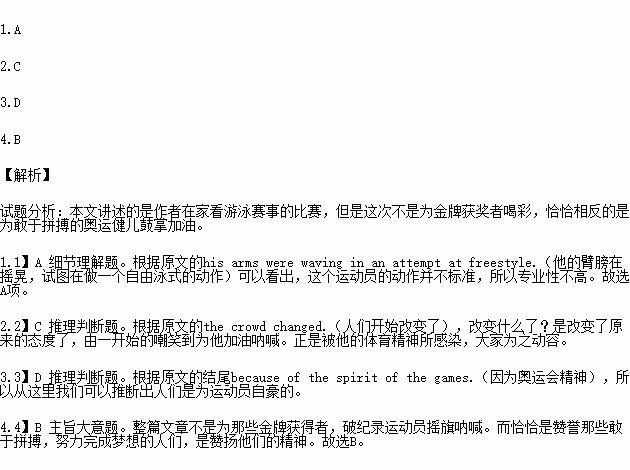题目内容
When I was watching a sports event yesterday, I met with an amazing sight. It was not a gold medal, or a world record broken, but a show of pure courage and determination.
The event was swimming. I watched a man dive off the blocks and knew right away that something was wrong. I'm not an expert swimmer, but I can tell a good dive from a poor one, and this was not exactly medal quality. When he resurfaced, it was evident that the man was not out for gold — his arms were waving in an attempt at freestyle.
I heard the crowd begin to laugh at this poor man who was clearly having a hard time. Finally he made his turn to start back. It was pitiful. He made a few desperate strokes (划水) and you could tell he was worn out. But in those few awkward strokes, the crowd changed. No longer were they laughing, but beginning to cheer. Some even began to stand and yell things like, "Come on, you can do it!" He did. The crowd went wild.
Just a short year ago, he had never even swum, let alone race. His country had been invited to take part in the event. Even though he recorded the slowest time, this man gave more heart than any of the other competitors—a man that gave his all, knowing that he had no chance but to compete because of the spirit of the games.
1.We know from the passage that the swimmer ________.
A. was not professional
B. had two competitors
C. had a wrong start
D. didn't try his best
2.What can be learned from the last two paragraphs?
A. The swimmer lost his spirit.
B. The swimmer didn't finish his match.
C. The audience was touched deeply by the swimmer.
D. The crowd supported the swimmer from the beginning.
3.The author's attitude towards the swimmer is that of ________.
A. tolerance
B. disappointment
C. carelessness
D. admiration
4.Which one is the best title of the story?
A. Successful Swimmers
B. Go for it
C. What an Event
D. Awkward Strokes
 夺冠训练单元期末冲刺100分系列答案
夺冠训练单元期末冲刺100分系列答案 新思维小冠军100分作业本系列答案
新思维小冠军100分作业本系列答案 名师指导一卷通系列答案
名师指导一卷通系列答案

 ),并在其下面写出该加的词。
),并在其下面写出该加的词。